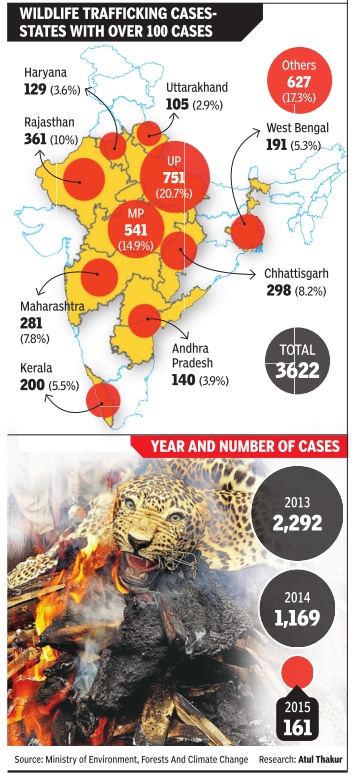Wildlife issues: India
This is a collection of articles archived for the excellence of their content. |
Contents |
Wildlife trafficking
2013-15

Wildlife deaths
Roadkills: App(lication) to report
Users can upload geo-tagged photos to a public forum, January 22, 2018: The Hindu
Be it tigers or toads, roads that cut through their habitats can be deathtraps for wild animals. Now, a mobile-based application, ‘Roadkills’, launched on January 21 by the Wildlife Conservation Trust, will help citizens to report such wildlife deaths by uploading geo-tagged photographs to a public forum. This can be used to identify crucial road or rail stretches that urgently require mitigation measures.
The app
‘Roadkills’, an easy-to-use android app, accesses location information from phones and permits users to upload photographs of a dead wild animal on a road or railway line. With the resulting geo-tagged photographs, users can also include what taxon the animal belongs to (bird, mammal, reptile or amphibian), the species’ name (if known) and the area where the roadkill was seen.
The information from all records reported from across India with this citizen science initiative will be compiled as a database, which can soon be viewed on a map on the campaign’s website (www.roadkills.in). The Wildlife Conservation Trust (WCT), a wildlife NGO which developed the app, will also share detailed data free of cost and under a Creative Commons licence to students, wildlife researchers or infrastructure agencies who may need it to study patterns of wildlife deaths on roads and railway lines.
How this can help
The information generated from the application can help identify crucial sections of roads or railway lines where animal deaths are high to pinpoint regions that require urgent mitigation measures. The data can also help determine what species are more at risk on specific road or rail stretches and plan the ideal mitigation measures suited for the location – from underpasses or overpasses for large mammals to canopy bridges for arboreal ones such as monkeys.
“Unplanned development of roads and railway lines is the major cause of wildlife roadkills,” wildlife biologist Milind Pariwakam of WCT said.
“We hope that the information from the campaign will help plan our infrastructure needs better and devise win-win solutions for wildlife to make our infrastructure development smart and green,” he added.
The app has had 500 installations so far and will soon be launched as an IOS application. It will also cater to regional language users in future.